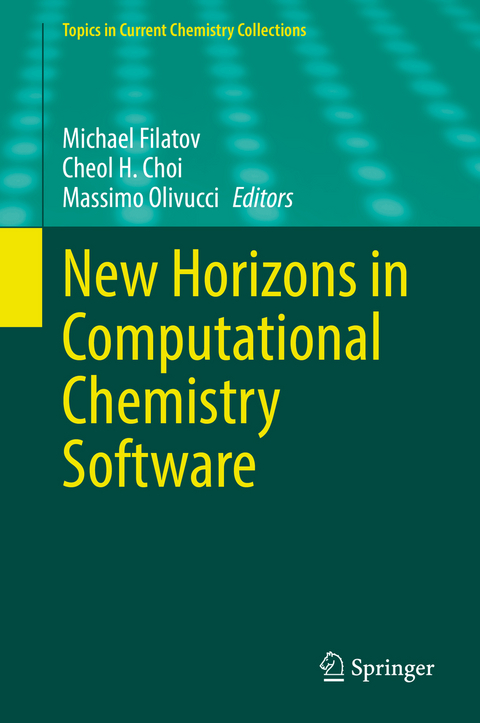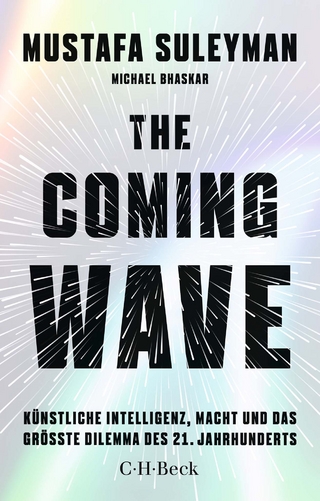
New Horizons in Computational Chemistry Software
Springer International Publishing (Verlag)
9783031076572 (ISBN)
Chapters "MLatom 2: An Integrative Platform for Atomistic Machine Learning" and "Evolution of the Automatic Rhodopsin Modeling (ARM) Protocol" are available open access under a CC BY 4.0 License via link.springer.com.
Michael Filatov received his PhD in 1992 with a thesis in Computational Physical Chemistry at the Institute of Catalysis in Novosibirsk, Russia. After that he has been a postdoctoral fellow with Walter Thiel at the University of Zurich, Switzerland, and with Sason Shaik at the Hebrew University of Jerusalem, Israel. In 2000, he was appointed assistant professor at the University of Gothenburg, Sweden, and between 2005 and 2011 he was a professor of chemistry at the University of Groningen, Netherlands. Afterwards, he was an EU research fellow at the University of Bonn, Germany, and a senior research scientist at the Ulsan National Institute of Science and Technology, South Korea. Since 2018, Michael is working as a research professor at the Kyungpook National University in Daegu, South Korea. His research interests focus on the development of computational methodologies for modeling ground and excited electronic state properties of organic, bio-inorganic and inorganic compounds and their application to modeling the non-adiabatic dynamics. Cheol Ho Choi received his PhD in 1998 with a thesis in Computational Physical Chemistry at the Georgetown University, USA. After that he has been a postdoctoral fellow with Mark Gordon at the Iowa State University, USA. After returning to South Korea in 2001, he was appointed assistant professor and ultimately become full professor at the Kyungpook National University, South Korea. His research interests focus on the development of computational methodologies for modeling ground and excited electronic state properties and their application to modeling the non-adiabatic dynamics. Massimo Olivucci received his PhD in 1989 with a Thesis in Theoretical Organic Chemistry at the University of Bologna, Italy, supervised by Fernando Bernardi. In the same year, he moved to the UK to carry out postdoctoral research with Michael A. Robb at King's College London. After returning to Italy in 1992, he started his independent academic career at the University of Bologna, ultimately becoming full professor of Organic Chemistry at the University of Siena in 2001. In 2006 he was also appointed Research Professor at the Centre for Photochemical Sciences, Bowling Green State University, Ohio, where he is in charge of the Laboratory for Computational Photochemistry and Photobiology. In 2015 he was appointed USIAS Fellow at the University of Strasbourg, France. In 2019-2020 he received the Doctoris Honoris Causa at the Aix-Marseille Universite, France. His interests span both methodological and applicative aspects of computational photochemistry and photobiology; two research fields that he contributed to shape.
Technological advances in remote collaborations.- MLatom 2: An Integrative Platform for Atomistic Machine Learning.- Reaction Space Projector (ReSPer) for Visualizing Dynamic Reaction Routes based on Reduced-Dimension Space.- NAST: Nonadiabatic statistical theory package for predicting kinetics of spin-dependent processes.- Evolution of the Automatic Rhodopsin Modeling (ARM) protocol.- Coupled- and independent-trajectory approaches based on the exact factorization using the PyUNIxMD package.- The Static-Dynamic-Static Family of Methods for Strongly Correlated Electrons: Methodology and Benchmarking.- Ensemble Density Functional Theory of Neutral and Charged Excitations.
| Erscheinungsdatum | 04.07.2022 |
|---|---|
| Reihe/Serie | Topics in Current Chemistry Collections |
| Zusatzinfo | VIII, 316 p. 64 illus., 63 illus. in color. |
| Verlagsort | Cham |
| Sprache | englisch |
| Original-Titel | New Horizons in Computational Chemistry Software |
| Maße | 155 x 235 mm |
| Gewicht | 653 g |
| Themenwelt | Sachbuch/Ratgeber ► Natur / Technik ► Naturwissenschaft |
| Informatik ► Theorie / Studium ► Künstliche Intelligenz / Robotik | |
| Naturwissenschaften ► Chemie ► Physikalische Chemie | |
| Schlagworte | Computational Chemistry • Computational Software • Data Visualization • electronic structure methods • machine learning • modular software • Non-Adiabatic Molecular Dynamics • Statistical and Monte Carlo methods |
| ISBN-13 | 9783031076572 / 9783031076572 |
| Zustand | Neuware |
| Informationen gemäß Produktsicherheitsverordnung (GPSR) | |
| Haben Sie eine Frage zum Produkt? |
aus dem Bereich


